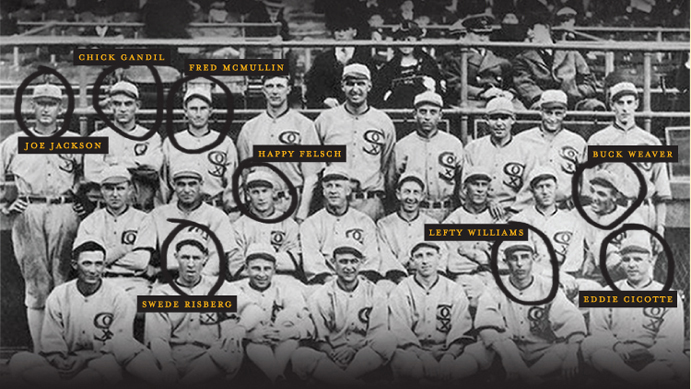The Chicago Black Sox scandal of 1919 is one of the most infamous incidents in the history of American sports, forever etched in the annals of baseball lore. It involved members of the Chicago White Sox, a professional baseball team, conspiring with gamblers to deliberately throw the World Series in exchange for monetary rewards. The scandal shook the foundation of the sport, eroded public trust, and led to significant reforms to prevent such corruption from ever happening again.
In the early 20th century, baseball was America’s pastime and a source of immense pride and entertainment for the nation. The Chicago White Sox, known colloquially as the “Black Sox” due to their infamous association with the scandal, were among the dominant teams in the league. Led by star players such as “Shoeless” Joe Jackson, Eddie Cicotte, and Oscar “Happy” Felsch, they were expected to perform exceptionally well during the 1919 World Series.

The 1919 World Series pitted the Chicago White Sox against the Cincinnati Reds. The White Sox were heavily favored to win, but little did the fans know that some of their favorite players had already struck a deal with a network of gamblers, led by notorious underworld figure Arnold Rothstein. These gamblers saw an opportunity to capitalize on the players’ greed and desire for quick money, using their knowledge and influence to corrupt the outcome of the games.
Eddie Cicotte, one of the key players involved, was promised a $10,000 bonus if he agreed to intentionally lose games. Cicotte, who had previously been denied a promised bonus by the team’s owner, was enticed by the offer. Other players soon followed suit, including “Shoeless” Joe Jackson, a beloved and immensely talented player whose involvement in the scandal remains a subject of controversy to this day.

As the World Series progressed, suspicions of a fix began to emerge. Observers noted unusual plays, errors, and underwhelming performances by some White Sox players. The rumors quickly spread like wildfire, staining the reputation of the sport and raising concerns about the integrity of the games.
At the conclusion of the series, the Cincinnati Reds emerged victorious, defeating the White Sox five games to three. The spotlight on the World Series heightened the scrutiny, and the truth about the fix gradually came to light. Sportswriters and fans demanded answers, and whispers of corruption grew louder.
In September 1920, a grand jury was convened to investigate the allegations of game-fixing. As evidence and testimonies were presented, the scope of the scandal became evident. Eight players from the Chicago White Sox were indicted on charges of conspiracy to commit sports bribery. Among them were Eddie Cicotte, “Shoeless” Joe Jackson, Oscar “Happy” Felsch, Arnold Gandil, Fred McMullin, Charles “Swede” Risberg, George “Buck” Weaver, and Claude “Lefty” Williams.
During the trial, the players confessed their involvement in the scheme, exposing the depths of their betrayal to the sport they loved and the fans who adored them. However, despite their admissions, the court proceedings did not yield the desired outcome for those seeking justice. The defense argued that there was no specific law against sports bribery, leading to the players’ acquittal.
Although the players were not found guilty in a court of law, the damage to the reputation of baseball was immense. The public’s trust in the sport had been shattered, and the league faced a crisis of confidence. Baseball’s integrity was called into question, and the future of the game was in jeopardy.
In response to the scandal and the public outcry, Major League Baseball took decisive action. In 1921, baseball’s first Commissioner, Kenesaw Mountain Landis, was appointed to restore faith in the game. Landis wasted no time in making a statement. He banned all eight players involved in the scandal from ever participating in professional baseball again, sending a powerful message that corruption and dishonesty would not be tolerated in the sport.
The banishment of the “Black Sox” marked a turning point for baseball. The incident brought about significant reforms to safeguard the integrity of the game. The creation of a strong and independent Commissioner’s office with broad authority to uphold discipline and transparency was one of the key changes. Landis became a symbol of the league’s commitment to maintaining the purity of baseball and protecting it from the influence of gambling interests.
The aftermath of the Black Sox scandal had a lasting impact on the sport. Baseball implemented stringent rules and regulations to prevent players from associating with gamblers and engaging in any form of corruption. The sport underwent a significant transformation, embracing new measures to ensure fair play and retain public trust.
While the Chicago Black Sox scandal remains a dark chapter in baseball history, it served as a cautionary tale for the entire sports world. The incident highlighted the risks of gambling and corruption in professional athletics, leaving a profound legacy that continues to influence the industry to this day.

The players involved in the scandal, especially “Shoeless” Joe Jackson, have remained subjects of debate and controversy over the years. Some argue that Jackson’s performance in the World Series did not suggest active participation in the fix, while others maintain that he was indeed complicit. Regardless, the damage to his reputation and the others involved was irreversible.
In popular culture, the Chicago Black Sox scandal has been immortalized in books, films, and documentaries, keeping the story alive for future generations. The tale of betrayal, greed, and redemption serves as a cautionary reminder of the importance of honesty, integrity, and fair play in the world of sports. The scandal continues to be a powerful reminder of the need for constant vigilance to preserve the purity of the games we hold dear.





